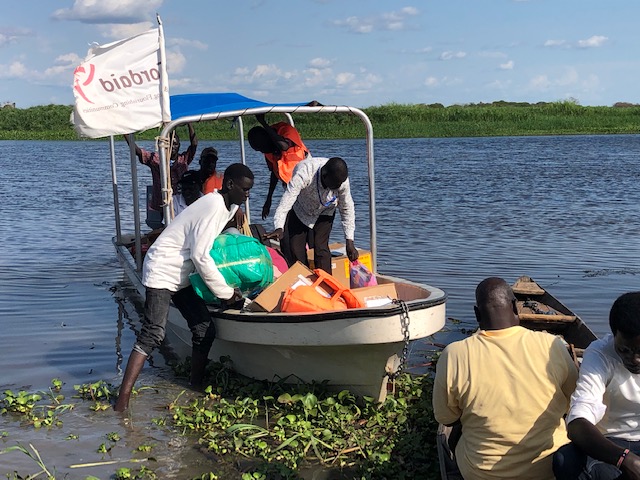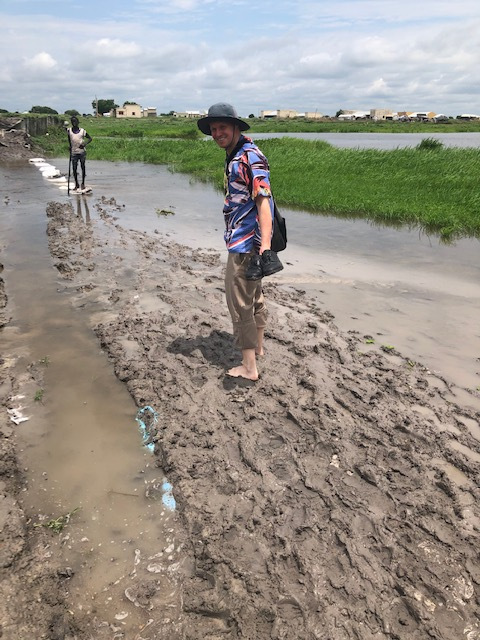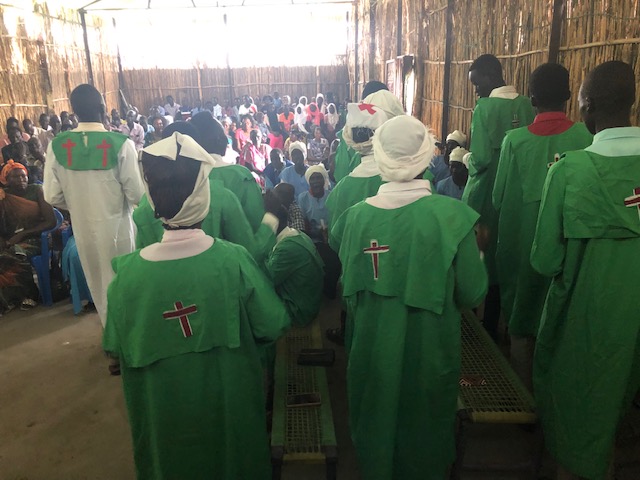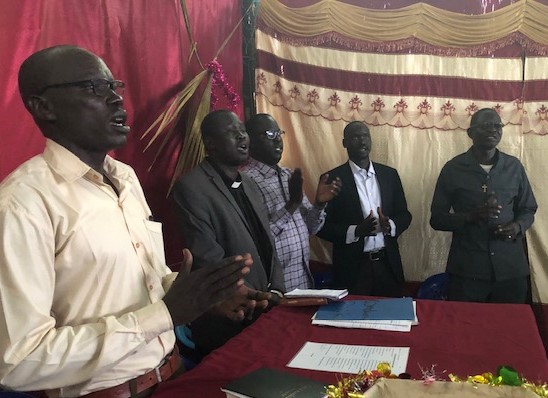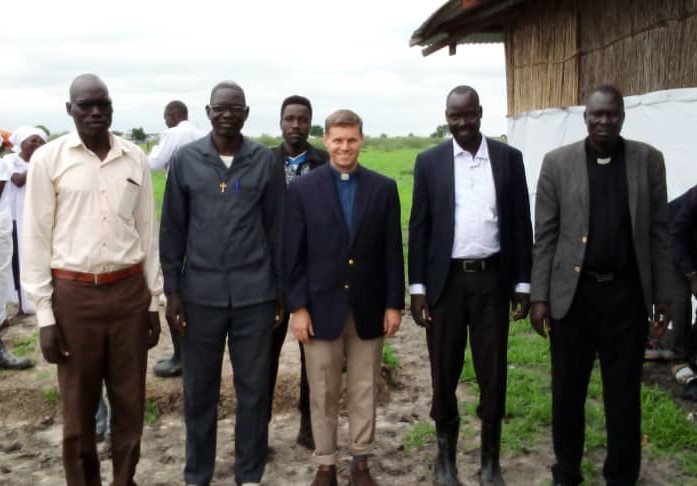A Letter from Bob and Kristi Rice, serving in South Sudan
Fall 2022
Write to Bob Rice
Write to Kristi Rice
Individuals: Give to E132192 in honor of Bob and Kristi Rice’s ministry
Congregations: Give to D500115 in honor of Bob and Kristi Rice’s ministry
Churches are asked to send donations through your congregation’s normal receiving site (this is usually your presbytery)
Subscribe to our co-worker letters
Dear friends,
On a late Monday afternoon in late July, we found ourselves almost at the end of our long journey. It was a miracle we had made it this far in one day. The small watercraft had run out of gas, and we found ourselves 50 meters shy of our destination floating downstream on the Nile. John Odhong, my faithful companion, suggested that we paddle with our hands to the side of the river and grab some reeds to arrest our ascent northwards. We did so as the leader of our party called for help. An hour later a canoe arrived with five liters of fuel. After a short trip upstream, we arrived in Kodok, the capital of Fashoda County, the home region of the Chollo (Shilluk) Kingdom. Upon arrival, we took off our shoes and waded to shore as members of the church received us. We were taken to the home of a church member where we washed down delectable fried fish with Coca-Cola. In response to our good fortune, arriving in Kodok from Juba within one day, Reverend Johnson Amum, our primary host, said to us, “The Lord must be with you.”
Rev. Johnson Amum, the focus of one of my case studies for my doctoral research, had invited us to Kodok to learn more about his life and ministry in the Chollo kingdom. Reverend Amum has been described as the “Father of contextual theology for Chollo people, particularly in terms of local song creation in connection with the Gospel.” The most significant factor of Chollo culture is the role of the king. The king of the Chollo kingdom serves as the primary mediator between God and the people. What the king says and does has an all-encompassing influence. It has been said that everything and everyone, all animals and all people, belong to the king. The people view themselves as servants or slaves of the king. When the king speaks, the people bow low to the earth and utter “Wo, Wo, Wo” (Lord, Lord, Lord).
Johnson’s father Ayik was the singer to six Chollo kings. Thus, Ayik had a personal relationship and friendship with these kings. If the king was angry, the people would run to Ayik, asking him to console the king through song, an act reminiscent of a shepherd boy named David who played his harp to console King Saul (see 1 Samuel 16: 23). Ayik was grooming his son Amum (Johnson) to take over the role of singer for the king. However, a unique set of circumstances led Amum in a different direction. Because of a stomach illness, probably schistosomiasis (or bilharzia), Amum was taken to the large port city of Malakal for treatment. As the sixteen-year-old boy recently initiated into manhood spent time in Malakal seeking medical treatment, young Amum found himself fascinated by a group of Christians marching through town on Christmas Eve. Amum followed them, entered the church with them, and began learning about Jesus through them. Under the guidance and mentorship of Reverend Peter Odok, the pastor of the church in Malakal, Amum was encouraged to use his natural ability to create songs not for the king of the Chollo people, but for the King of kings, Jesus Christ. Amum continued on this path, remaining in Malakal and later in north Sudan, navigating his faith and his culture as they both intersected and diverged from one another.During our time in Kodok, Rev. Johnson Amum made himself fully available to us. We spent hours upon hours asking questions and learning about his life and about the Chollo people. He arranged for us to meet with members of the church and community who have known Johnson for decades. One wonderful and glorious sight was seeing an old friend of Johnson warmly embrace him and hold him for several minutes before engaging him in loud and joyful conversation. As we continued to meet and hear stories, it became clear that Rev. Johnson has thought deeply about the different ways in which the Gospel and the Christian faith interact with culture and the traditional ways of the Chollo people. Johnson articulated points of connection and disconnection concerning the Gospel and the culture of the Chollo people. Rev. Johnson, a pioneer evangelist, planted many of the churches in the region during the early 2000s. When we worshiped together on Sunday, choirs energetically sang a couple of the important songs that Rev. Johnson Amum had created. These songs incorporated traditional forms of worship in song and dance and were filled with the message of Jesus Christ.
On the following Tuesday, John and I again found ourselves in a small watercraft. Due to our good fortune of getting seats on the speedboat of a non-government organization (NGO) traveling to Malakal, Rev. Johnson Amum again said to us, “The Lord must be with you.” My new friend Johnson Amum stayed as long as possible on the shoreline, waiting to see us off.
There are lots of books published in the western world and beyond about contextual theology. In Rev. Johnson Amum, I have found a local practitioner of this majestic artform, a local pastor and evangelist who has brought thousands of Chollo people to a deeper knowledge and understanding of God, through the person of Jesus Christ, being inspired by the spirit of innovation, humility and love.
Bob
Please read the following letter from Rev. Mienda Uriarte, acting director of World Mission:
Dear Partners in God’s Mission,
What an amazing journey we’re on together! Our call to be a Matthew 25 denomination has challenged us in so many ways to lean into new ways of reaching out. As we take on the responsibilities of dismantling systemic racism, eradicating the root causes of poverty and engaging in congregational vitality, we find that the Spirit of God is indeed moving throughout World Mission. Of course, the past two years have also been hard for so many as we’ve ventured through another year of the pandemic, been confronted with racism, wars and the heart wrenching toll of natural disasters. And yet, rather than succumb to the darkness, we are called to shine the light of Christ by doing justice, loving kindness and walking humbly with God.
We are so grateful that you are on this journey as well. Your commitment enables mission co-workers around the world to accompany partners and share in so many expressions of the transformative work being done in Christ’s name. Thank you for your partnership, prayers and contributions to their ministries.
We hope you will continue to support World Mission in all the ways you are able:
Give – Consider making a year-end financial contribution for the sending and support of our mission personnel (E132192). This unified fund supports the work of all our mission co-workers as they accompany global partners in their life-giving work. Gifts can also be made “in honor of” a specific mission co-worker – just include their name on the memo line.
Pray – Include PC(USA) mission personnel and global partners in your daily prayers. If you would like to order prayer cards as a visual reminder of those for whom you are praying, please contact Cindy Rubin (cynthia.rubin@pcusa.org; 800-728-7228, ext. 5065).
Act – Invite a mission co-worker to visit your congregation either virtually or in person. Contact mission.live@pcusa.org to make a request or email the mission co-worker directly. Email addresses are listed on Mission Connections profile pages. Visit pcusa.org/missionconnections to search by last name.
Thank you for your consideration! We appreciate your faithfulness to God’s mission through the Presbyterian Church (U.S.A.).
Prayerfully,

Rev. Mienda Uriarte, Acting Director
World Mission
Presbyterian Mission Agency
Presbyterian Church (U.S.A.)
To give, please visit https://bit.ly/22MC-YE.
For it is the God who said, ‘Let light shine out of darkness,’ who has shone in our hearts to give the light of the knowledge of the glory of God in the face of Jesus Christ. 2 Corinthians 4:6
![]() You may freely reuse and distribute this article in its entirety for non-commercial purposes in any medium. Please include author attribution, photography credits, and a link to the original article. This work is licensed under a Creative Commons Attribution-NonCommercial-NoDeratives 4.0 International License.
You may freely reuse and distribute this article in its entirety for non-commercial purposes in any medium. Please include author attribution, photography credits, and a link to the original article. This work is licensed under a Creative Commons Attribution-NonCommercial-NoDeratives 4.0 International License.
